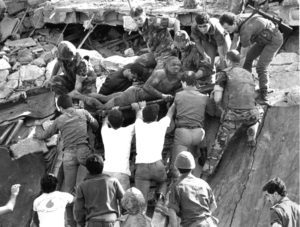October 24, 1983 TNT terrorists attack Beirut International Airport
At least 161 American marines and sailors were killed and 75 were injured when suicide terrorists driving a truck loaded with TNT blew up a Marine headquarters at Beirut International Airport. A Pentagon spokesman said the truck broke through a series of steel fences and sandbag barricades and exploded in the heart of the headquarters shortly before dawn. Two miles away, another bomb-laden truck crashed into a French barracks, killing at least 12 French paratroopers and wounding 13. Fifty-three paratroopers were missing and believed buried in the rubble. (Page A1, Column 6.) The explosion at the Marines’ headquarters building was so massive it dug a crater in the heart of the structure 30 feet deep and 40 feet wide. ”Bodies were lying around all over,” said a rescuer. ”Other people were trapped under the concrete. I could hear them screaming: ‘Get us out. Don’t leave us.’ I just started digging, picking men out.” (A1:5.)
President Reagan, voicing outrage over the ”despicable” destruction of the Marine Corps headquarters, called on the nation to be more determined than ever to keep the force there and resist ”the bestial nature of those who would assume power.” Officials stressed there would be no change in the United States’s military role in Lebanon. (A1:1.) Legislators from both parties said the Reagan Administration must redefine and clarify the role of the marines in Lebanon and their long-range mission in the Middle East. (A8:1-2.) Prime Minister Pierre Mauroy condemned the bombing attacks on French and American troops and indicated that France would maintain its forces in Lebanon for the time being. But Mr. Mauroy, speaking after a meeting with President Francois Mitterrand, made no firm commitment about Paris’s intentions beyond the immediate future. (A7:1-3.) Americans reacted to the mass slaying of marines with shock, outrage, sorrow and expressions of doubt about American involvement in Lebanon. People demanded to know how the attack could have been allowed to occur. (A9:1-2.) Marines reacted with anger and uncertainty. Most marines and residents of Jacksonville, N.C., near Camp LeJeune said that if the marines were not allowed to protect themselves better, they should be withdrawn. (A9:5-6.) The terrorist attacks were aimed at undermining the planned Geneva peace conference of Lebanon’s religious and political leaders, according to some Lebanese officials. Others said the attacks appeared to be an effort to force the withdrawal of the international force. (A6:1-2.) Efforts to strengthen security were taken by the Marine force at the Beirut airport after a car bomb blew up the American Embassy in Beirut in April and killed 63 people, according to Marine Corps officials.
Source: Monday October 24, 1983 bombings in Beirut: New York Times




